How Social Media Political Manipulation Works
- Last Updated: June 12th, 2025

Attorney Jessie Paluch, founder of TruLaw, has over 25 years of experience as a personal injury and mass tort attorney, and previously worked as an international tax attorney at Deloitte. Jessie collaborates with attorneys nationwide — enabling her to share reliable, up-to-date legal information with our readers.
Legally Reviewed
This article has been written and reviewed for legal accuracy and clarity by the team of writers and legal experts at TruLawsuit Info and is as accurate as possible. This content should not be taken as legal advice from an attorney. If you would like to learn more about our owner and experienced injury lawyer, Jessie Paluch, you can do so here.
Fact-Checked
TruLawsuit Info does everything possible to make sure the information in this article is up to date and accurate. If you need specific legal advice about your case, contact our team by using the chat on the bottom of this page. This article should not be taken as advice from an attorney.
Key Takeaways:
- Political manipulation of social media involves tactics used by PR firms, media outlets, and social platforms to influence public opinion and sway election outcomes.
- Disinformation campaigns, astroturfing, and algorithms' amplifying effects contribute to the spread of fake news, manufactured grassroots support, and politically biased echo chambers on social media.
- Combating social media manipulation requires collaborative efforts between governments, platforms, and citizens, including fact-checking initiatives, media literacy education, content moderation, and adapting regulations.
Overview of Social Media Political Manipulation
On this page, we’ll discuss Social Media political manipulation, how social media platforms can be used to influence political opinions, potential impact of political manipulation on democracy, and much more.
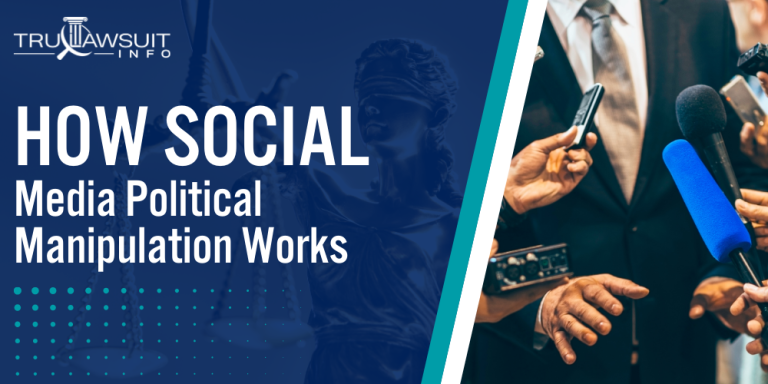
Intro to Social Media Political Manipulation
Some of the key aspects of Social Media Political Manipulation include, but are not limited to:
- Targeted Advertising: Social media platforms can be used to deliver targeted political ads based on user data, potentially influencing voting behavior.
- Algorithmic Bias: Algorithms used by social media platforms may prioritize certain political content, leading to biased information exposure.
- Fake News and Misinformation: The spread of fake news and misinformation on social media can manipulate public opinion and undermine trust in democratic institutions.
- Foreign Interference: Foreign actors can use social media to interfere in the political processes of other countries, as seen in recent elections.
If you believe that you have been a victim of social media political manipulation, you may have legal options to seek recourse.
Contact Tru Lawsuit Info today using the chat on this page to receive an instant case evaluation.
Table of Contents
The Rise of Social Media in Political Campaigns
Social media has become a central arena for political discourse and campaigning, altering how candidates connect with voters and shape public opinion.
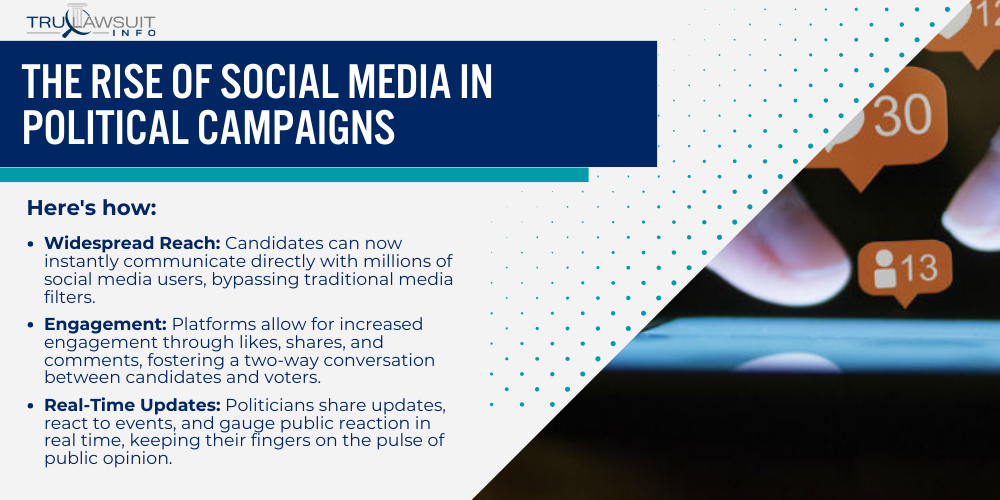
Leveraging Social Platforms to Reach Voters
Social media platforms have revolutionized how politicians communicate with the electorate.
Here’s how:
- Widespread Reach: Candidates can now instantly communicate directly with millions of social media users, bypassing traditional media filters.
- Engagement: Platforms allow for increased engagement through likes, shares, and comments, fostering a two-way conversation between candidates and voters.
- Real-Time Updates: Politicians share updates, react to events, and gauge public reaction in real time, keeping their fingers on the pulse of public opinion.
- Cost-Effective: It is more cost-efficient to reach potential voters on social media than through traditional media outlets.
Microtargeting and Personalized Messaging
The precision of microtargeting has transformed political campaigning.
Key aspects include:
- Data Analysis: Campaigns analyze large datasets to understand voter preferences and tailor messages to specific demographics.
- Personalization: Messages and ads are personalized to resonate with individual voters, potentially influencing their opinions and behavior.
- Social Media Accounts Creation: Multiple user and bot accounts can be utilized to amplify messages or create the appearance of widespread support.
- Mobile Devices Networks: Utilizing mobile networks ensures personalized messages reach voters directly on their smartphones, where they spend much of their time.
By integrating media technologies with political strategy, candidates can substantially impact election outcomes, national security, and the overall direction of public discourse.
Tactics Used in Social Media Political Manipulation
Social media has become a fertile ground for political manipulation, with several tactics being used to shape public opinion and influence political outcomes.
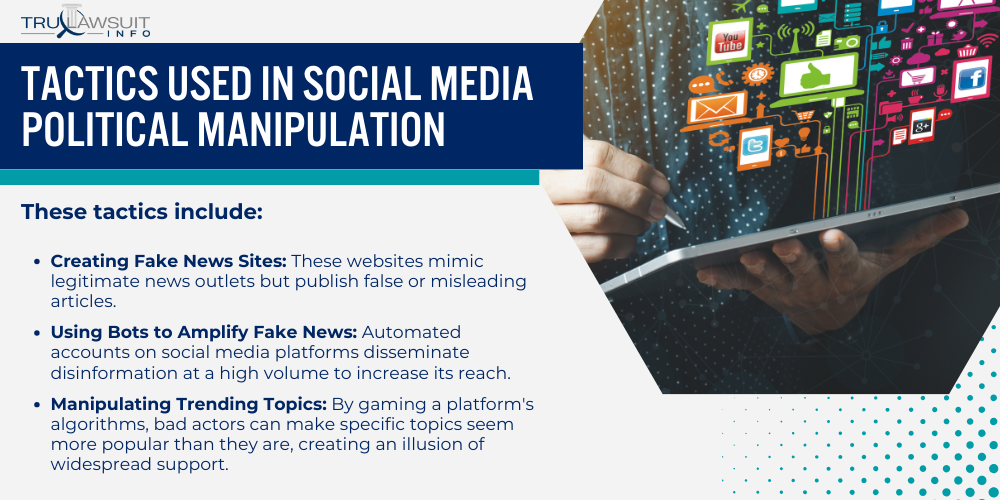
Disinformation and Fake News Dissemination
Disinformation campaigns leverage social media’s reach to spread disinformation deliberately.
These tactics include:
- Creating Fake News Sites: These websites mimic legitimate news outlets but publish false or misleading articles.
- Using Bots to Amplify Fake News: Automated accounts on social media platforms disseminate disinformation at a high volume to increase its reach.
- Manipulating Trending Topics: By gaming a platform’s algorithms, bad actors can make specific topics seem more popular than they are, creating an illusion of widespread support.
- Distributing Doctored Images and Videos: Edited media is used to create an intentionally false information narrative or discredit political figures.
Astroturfing and Manufactured Grassroots Support
Astroturfing is making a campaign or organization appear as though it has organic, grassroots support when it is orchestrated.
Tacticians achieve this through:
- Creating Fake Social Media Profiles: Numerous inauthentic profiles engage with content to give the impression of genuine public backing.
- Coordinated Posts and Hashtags: These profiles post content or use specific hashtags strategically to simulate genuine trends.
- They are hiring people to Pose as Supporters: Individuals or groups are paid to act as though they fervently back a cause or candidate.
- Hosting Fake Events: Events are organized to give the media and the public the impression that there is enthusiasm behind a campaign.
The Role of Algorithms in Amplifying Manipulation
Social media platforms harness complex search algorithms designed by technology companies, which unintentionally contribute to the spread of manipulated information.
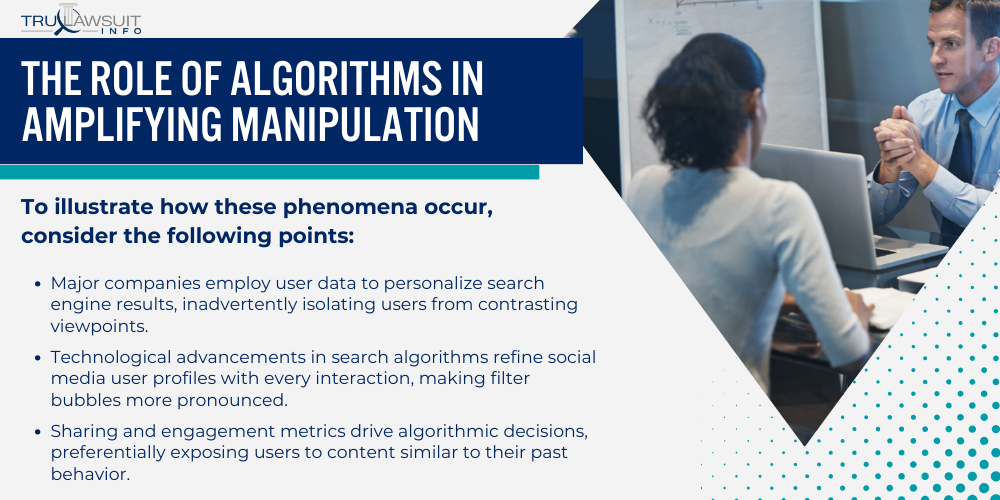
These algorithms are central to how users encounter political content, with significant implications for democratic discourse.
Filter Bubbles and Echo Chambers
Filter bubbles and echo chambers are shaped by algorithms that curate content aligning with individual preferences, reinforcing existing beliefs.
To illustrate how these phenomena occur, consider the following points:
- Major companies employ user data to personalize search engine results, inadvertently isolating users from contrasting viewpoints.
- Technological advancements in search algorithms refine social media user profiles with every interaction, making filter bubbles more pronounced.
- Sharing and engagement metrics drive algorithmic decisions, preferentially exposing users to content similar to their past behavior.
- As a result, users may find themselves in echo chambers, surrounded by agreeable content, insulating them from diverse perspectives.
Algorithmic Bias and Selective Exposure
Algorithmic bias refers to the inclination of algorithms to favor certain types of content, leading to a phenomenon known as selective exposure.
The following items are crucial to understanding algorithmic bias:
- Algorithms prioritize content likely to generate user engagement, regardless of its veracity.
- Selective exposure is strengthened as users predominantly see content reaffirming their beliefs.
- Technology companies continually adjust algorithms, which can inadvertently prioritize sensational or polarizing content.
- This bias in content curation can skew public perception and amplify political manipulation on social media platforms.
Foreign Interference in Elections via Social Media
In the digital age, social media has become a battleground where foreign adversaries attempt to influence elections.
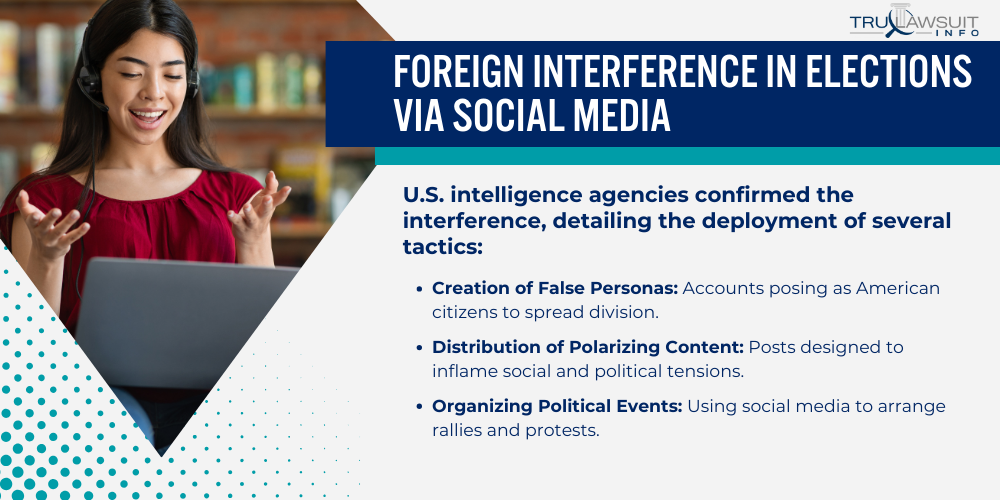
These entities execute sophisticated campaigns to sway public opinion and disrupt the democratic process.
Russian Meddling in the 2016 U.S. Presidential Election
In 2016, Russian entities engaged in an orchestrated attempt to impact the presidential election in the United States.
U.S. intelligence agencies confirmed the interference, detailing the deployment of several tactics:
- Creation of False Personas: Accounts posing as American citizens to spread division.
- Distribution of Polarizing Content: Posts designed to inflame social and political tensions.
- Organizing Political Events: Using social media to arrange rallies and protests.
- Hacking and Releasing Sensitive Information: Targeting journalists, political parties, and leaking data.
This meddling, attributed to Kremlin-linked groups, was not just an isolated incident but part of a larger strategy by authoritarian regimes to undermine democratic institutions.
Influence Campaigns Targeting Other Nations
Foreign interference on social media extends beyond the U.S., affecting many nations.
These campaigns share standard methods and objectives:
- Disinformation Spread: The propagation of fake news to create confusion.
- Amplification of Existing Fractures: Targeting societal divisions to exacerbate discord.
- Engagement with Political Influencers: Co-opting or mimicking thought leaders.
- Cyber attacks on Election Infrastructure: Compromising systems to challenge election integrity.
The actors behind these manipulation campaigns often intend to destabilize political landscapes, eroding trust in electoral processes worldwide.
Foreign interference in elections poses significant risks, and the global community continues to search for effective defenses against these subversive tactics.
The Psychological Impact of Social Media Manipulation
Social media manipulation can profoundly affect how people think, feel, and behave.
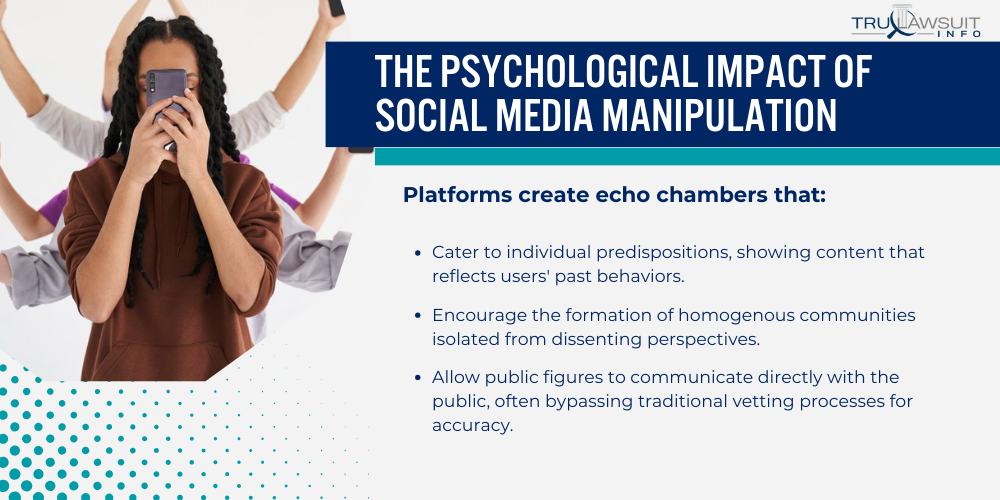
It can reinforce personal biases, shape the public perception of figures and social movements, and contribute to societal polarization.
Confirmation Bias and Reinforcing Existing Beliefs
Social media amplifies confirmation bias, where users gravitate towards information that aligns with their beliefs.
Platforms create echo chambers that:
- Cater to individual predispositions, showing content that reflects users’ past behaviors.
- Encourage the formation of homogenous communities isolated from dissenting perspectives.
- Allow public figures to communicate directly with the public, often bypassing traditional vetting processes for accuracy.
- Heighten the visibility of content that resonates with users, sometimes regardless of its factual correctness.
Emotional Manipulation and Polarization
Social media can also emotionally manipulate users, leading to increased political polarization.
Here’s how emotions are targeted:
- Content is often designed to provoke strong emotions, keeping users engaged.
- Polarizing topics are frequently pushed to the forefront, sparking intense reactions.
- Algorithms may prioritize content that leads to divisiveness, strengthening in-group versus out-group dynamics.
- The rapid spread of emotionally charged misinformation can mobilize social movements based on false premises.
Social media’s structure and algorithms can inadvertently perpetuate biases and manipulation, reinforcing one’s beliefs and escalating emotional responses to polarizing content.
The social media environment is carefully constructed to maintain user engagement but also perpetuates these psychological impacts.
Combating Social Media Political Manipulation
In the digital age, social media platforms are battlegrounds for political influence, where misinformation can spread rapidly.
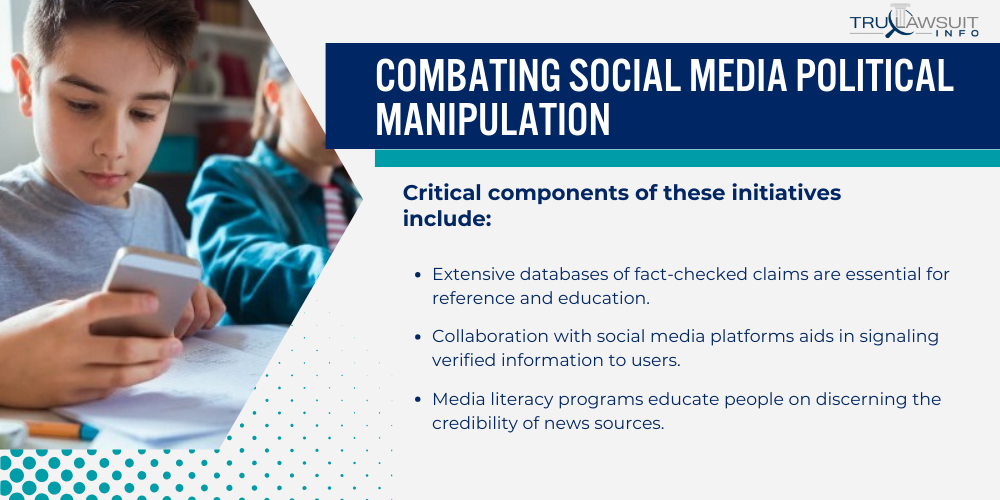
Effective strategies are essential to preserve the integrity of public discourse.
Fact-checking and Media Literacy Initiatives
Fact-checking and improving media literacy are critical lines of defense against political manipulation on social media.
Organizations have emerged as guardians of truth, dissecting statements, and claims to ensure the public receives accurate information.
Critical components of these initiatives include:
- Extensive databases of fact-checked claims are essential for reference and education.
- Collaboration with social media platforms aids in signaling verified information to users.
- Media literacy programs educate people on discerning the credibility of news sources.
- Critical thinking skills allow users to question the validity of the information they encounter.
Individuals can develop a keen eye for distinguishing factual content from fabricated narratives through these initiatives.
Regulatory Efforts and Platform Responsibility
Platforms must assume a degree of responsibility, and regulatory efforts are pivotal in enforcing this accountability.
Social media companies are implementing more sophisticated algorithms to detect and flag dubious content.
Further steps taken by platforms and regulators to enhance accountability include:
- Transparency in content moderation policies establishes trust with users.
- Regular audits of algorithmic systems ensure fairness and prevent unintended biases.
- Regulatory Efforts: Governments are crafting legislation to hold platforms accountable for the content they host.
- Collaborating on international standards can lead to a more cohesive approach to platform regulation.
Such regulatory interventions and platform measures reinforce a framework where political manipulation is less likely to thrive unnoticed.
The Future of Social Media in Political Discourse
As social media evolves, the intersection of technology and political communication presents challenges and opportunities.
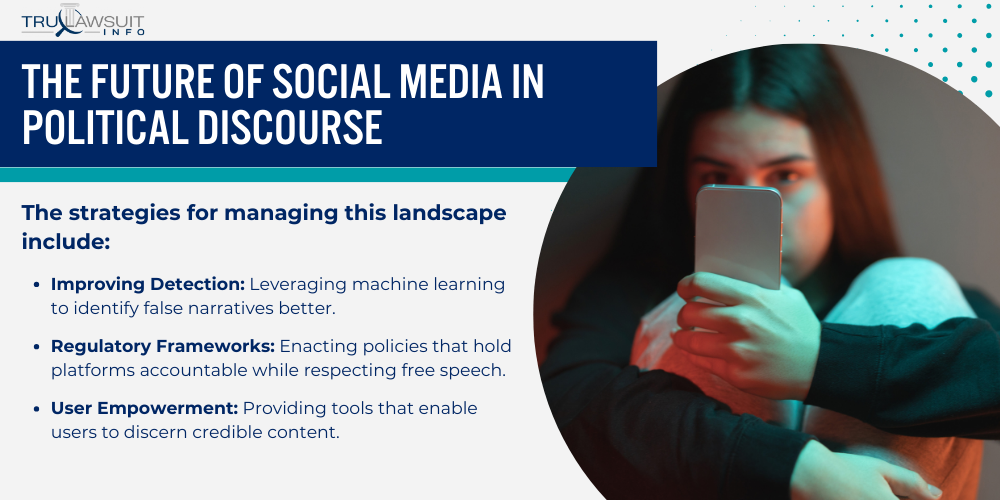
The online ecosystem must balance open dialogue, mitigate misinformation, and adapt to sophisticated modes of manipulation.
Balancing Free Speech and Misinformation Prevention
Artificial intelligence and automated accounts have significantly changed the dynamics of how information is shared in the online environment.
The strategies for managing this landscape include:
- Improving Detection: Leveraging machine learning to identify false narratives better.
- Regulatory Frameworks: Enacting policies that hold platforms accountable while respecting free speech.
- User Empowerment: Providing tools that enable users to discern credible content.
- Transparency Initiatives: Mandating platforms to clarify how information is filtered and amplified.
Adapting to Evolving Manipulation Techniques
As new media technologies emerge, they bring fresh channels for political messaging and the potential for abuse.
Steps being taken to address these changes comprise:
- Continuous Learning: Systems must be designed to learn and evolve to keep pace with new manipulation tactics.
- Cross-Platform Collaboration: Entities must work together, sharing insights to combat disinformation.
- Public Education: Investment in programs to equip the public to evaluate social media content critically.
- Secure Practices: Encouraging more robust security measures to protect against unauthorized influence.
Preserving Democracy in the Digital Age
In the wake of digital expansion, strategies to safeguard democratic processes and civil liberties have become imperative.
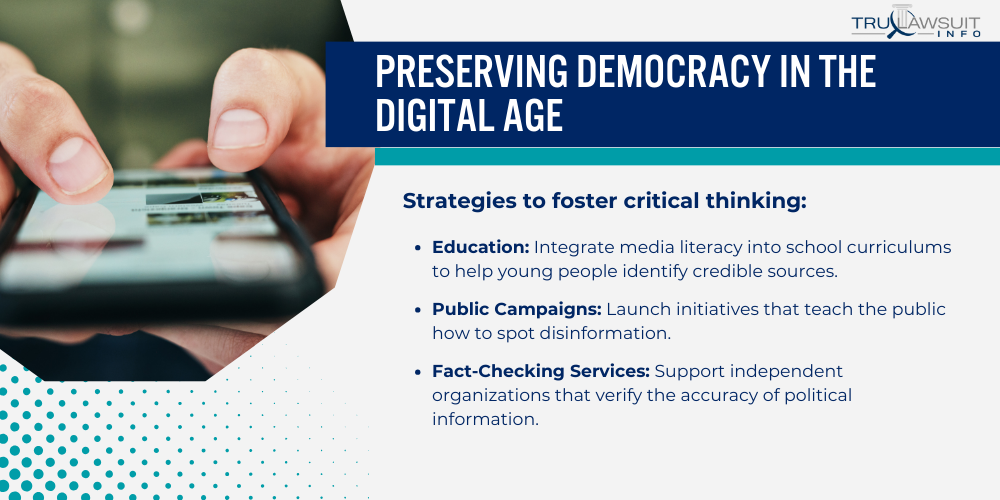
Encouraging Critical Thinking and Informed Voting
To maintain the integrity of the public conversation, citizens must cultivate critical thinking and pursue informed voting.
Strategies to foster critical thinking:
- Education: Integrate media literacy into school curriculums to help young people identify credible sources.
- Public Campaigns: Launch initiatives that teach the public how to spot disinformation.
- Fact-Checking Services: Support independent organizations that verify the accuracy of political information.
- Informed Discussions: Create forums for civil debate to exchange views constructively.
Collaboration Between Governments, Platforms, and Citizens
A united approach is vital for upholding social institutions in the digital environment.
Methods for effective collaboration:
- Policy Adaptation: Governments should update election laws to address digital campaign tactics.
- Transparent Reporting: Social media platforms must disclose political ad funding and targeting methods.
- Community Engagement: Encourage local groups to participate in monitoring online political discourse.
- Protection Measures: Implement tools to enhance privacy and secure online spaces against manipulation.
By employing these tactics, societies can protect democratic values and boost civic engagement in the digital age.
TruLawsuit Info: #1 Social Media Lawyers
TruLawsuit, reputed as a leading attorney in social media law, specializes in legal challenges related to the digital sphere.
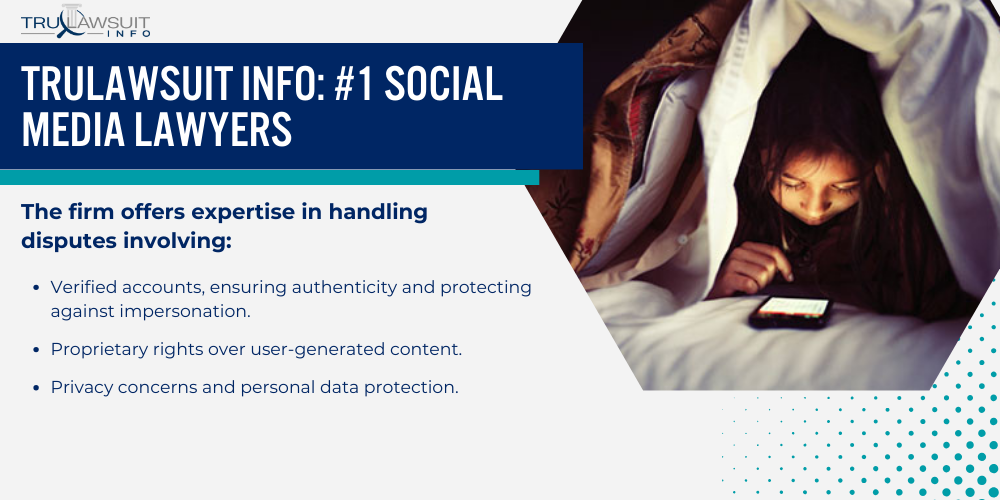
They address issues where law and online platforms intersect, ensuring their clients’ rights are robustly defended.
Online Content Creation and user-generated content present unique legal challenges.
TruLawsuit advises individuals and businesses on safeguarding their creative outputs and complying with regulations.
The firm offers expertise in handling disputes involving:
- Verified accounts, ensuring authenticity and protecting against impersonation.
- Proprietary rights over user-generated content.
- Privacy concerns and personal data protection.
- Defamation and reputational management cases.
Understanding the significance of a verified account helps maintain trust and credibility online.
TruLawsuit guides clients through the verification process and intervenes when disputes arise from misrepresented accounts.
With its expanding digital footprint, TruLawsuit supports its clientele by providing clarity and legal direction.
The attorneys remain informed on the latest media law updates, reflecting their confidence and dedication to representing their clients’ online presence.
Frequently Asked Questions
-
What techniques are employed in the manipulation of public opinion through social media?
Entities manipulate public opinion through social media by deploying various sophisticated techniques.
Targeted advertising uses personal data to show individuals content aligned with their beliefs, while bots and fake accounts amplify specific narratives.
The echo chamber effect reinforces existing views by limiting exposure to diverse perspectives.
Deepfakes and doctored content mislead viewers by presenting fabricated realities.
-
How does the spread of misinformation on social media platforms influence political outcomes?
The spread of misinformation can significantly shift political gain outcomes by forming false beliefs and swaying voter opinions.
Erroneous information that travels rapidly through networks often gains traction before it can be corrected, impacting the decisions made in the ballot box and potentially altering the course of elections.
-
What are the consequences of social media manipulation on democratic processes?
Social media manipulation threatens democratic processes by undermining trust in the system and distorting public discourse.
It can lead to polarization, as extreme views get more visibility, and disinformation campaigns can disenfranchise voters, eroding the foundation of fair and free elections.
-
How do political entities use social media to shape electoral campaigns?
Political entities utilize social media to craft and disseminate campaign messages directly to voters.
They use data analytics to refine targeting strategies and create viral content that can spread rapidly.
Real-time feedback from social media provides insights into voter reactions, allowing campaigns to adjust tactics swiftly.
-
In what ways does the interplay between social media algorithms and user behavior facilitate political manipulation?
The interplay between algorithms and user behavior creates an environment ripe for political manipulation.
Social media platforms prioritize content that triggers engagement, which can favor sensational or polarizing material.
This, coupled with users’ tendency to interact with content that aligns with their beliefs, forms looped patterns that strengthen and spread particular political ideologies.
-
What measures can be taken to mitigate the effects of political manipulation on social media?
Efforts to mitigate political manipulation include enhancing transparency concerning source credibility and algorithmic processes.
Educating users about the signs of propaganda and misinformation is crucial, and fact-checking services must be robust and widely accessible.
Legislation to regulate political advertising online also plays a critical role in protecting the integrity of democratic discourse.

Experienced Attorney & Legal SaaS CEO
With over 25 years of legal experience, Jessie is an Illinois lawyer, a CPA, and a mother of three. She spent the first decade of her career working as an international tax attorney at Deloitte.
In 2009, Jessie co-founded her own law firm with her husband – which has scaled to over 30 employees since its conception.
In 2016, Jessie founded TruLaw, which allows her to collaborate with attorneys and legal experts across the United States on a daily basis. This hypervaluable network of experts is what enables her to share reliable legal information with her readers!
Have A Case?
Here, at Tru Lawsuit Info, we’re committed to helping victims get the justice they deserve.
To do this, we actively work to connect them with attorneys who are experts in litigating cases similar to theirs.
Would you like our help?
Tru Lawsuit Info is a reliable source of information about issues that may affect your health and safety, such as faulty products, data breaches, and environmental hazards.
Our team of experienced writers collaborates with medical professionals, lawyers, and advocates to produce informative articles, guides, and other resources that raise awareness of these topics.
Our thorough research provides consumers with access to reliable information and updates on lawsuits happening around the country. We also can connect consumers with attorneys if they need assistance.
Camp Lejeune's water contamination issue spanned several decades starting in the 1950s. Exposure to these chemicals has been linked to various serious health issues, including cancer, organ diseases, and death.
Research is increasingly suggesting a link between the use of Tylenol during pregnancy and the development of neurodevelopmental disorders, such as autism and ADHD, in infants.
Legal action is being taken against manufacturers of Aqueous Film-Forming Foam (AFFF), a chemical used in fighting fires. The plaintiffs allege that exposure to the foam caused health issues such as cancer, organ damage, and birth and fertility issues.
Have A Case?
Here, at Tru Lawsuit Info, we’re committed to helping victims get the justice they deserve.
To do this, we actively work to connect them with attorneys who are experts in litigating cases similar to theirs.
Would you like our help?







